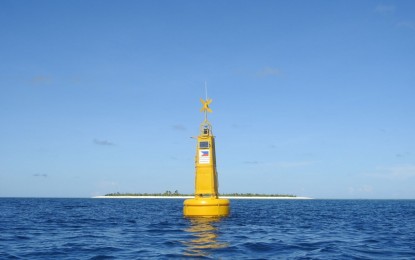
One of the buoys installed in the West Philippine Sea. (Photo courtesy of PCG)
MANILA – The Philippines must counter China’s “harassment” within its waters by exposing activities or the “gray zone operations” in the South China Sea, analysts said Wednesday.
In a Stratbase ADRI forum in Makati City, various security and maritime law experts said China had been using these “gray zone” tactics or activities that are below the threshold of what constitutes aggression to prevent the country from using self-defense.
While doing so, University of the Philippines Institute for Maritime Affairs and Law of the Sea Director Jay Batongbacal said Beijing achieves its objectives that would have been attained by force.
“In the West Philippine Sea, we see these gray zone operations occurring on daily basis and they have at least two dimensions – one is visible seaborne operations,” he said.
This dimension, he said, could include the People’s Liberation Army (PLA) Navy’s activities occurring in the background, the Chinese Coast Guard (CCG) invoking Beijing’s “rights” under its so-called historical claims over the South China Sea to the deployment of maritime militia and fishing vessels, which had swarmed over several areas in the Spratlys in the past.
The second dimension, he said, involves “information operation” to reinforce the narratives that these seaborne operations are intended to convey.
“(These are) narratives of powerlessness meaning that they are somehow persuaded and convinced that they cannot do anything about these competitive actions by the other state,” Batongbacal said.
Last month, Foreign Affairs Secretary Enrique Manalo confirmed that the Philippines has encountered “daily incidents” of harassment in the West Philippine Sea, which in many cases prevented the Philippines from maximizing its 200-nautical-mile exclusive economic zone.
Also on March 4, the Philippine Coast Guard recorded the presence of at least 42 suspected Chinese maritime militia ships, a CCG, and a PLA Navy vessel anchored in the vicinity of Pag-asa Island, which serves as the seat of the local government of Kalayaan, Palawan.
As of this posting, the Chinese Embassy in Manila has yet to comment on the reported PLA Navy ship near the island.
‘Gray turning black, white’
Chinese operations in the South China Sea are transforming and changing “from gray to black and white,” Batongbacal warned.
“Chinese activities, especially since 2019, are becoming more and more clearly hostile and aggressive. They are actually crossing the threshold for the threat or the use of force in legal terms,” he said. “We’re seeing the military forces of China in the maritime arena – the PLA Navy, the China Coast Guard, becoming more and more coordinated, especially with their maritime militia and they are acting in concerted manner against Philippine government ships."
He said the Philippines must act and put in place policies to “hold this slow incremental escalation.”
He said the country could establish a “policy of attribution” that clearly lays out what is considered to be Chinese government actions regardless of the color of the vessel or the type of the ship.
“(China) should not be able to make use of these so-called gray zones and legal loopholes because what makes gray zone effective is gaps and loopholes,” he said.
He said the government should also consider coordinating and engaging with allies in collective deterrence.
“We should be together engaging in contingency planning and coordinating our policies, our activities, our responses etcetera, so that we may all be acting under a kind of united front,” he said. “We should demonstrate to China that its gray zone activities and various other shenanigans will no longer be effective because there will be a united and collective response from all fronts wherever they may be.”
This was echoed by Stratbase President Dindo Manhit and retired Rear Admiral Rommel Jude Ong, who said support from the Association of Southeast Asian Nations is also necessary to overturn gray zone tactics.
The Stratbase ADRI supports an “all-out cooperation” in defending the rules-based international order in the region, Manhit said.
“As we move towards a complex, multipolar world, the Marcos Jr. administration must continue implementing an independent foreign policy that is driven by and that upholds national interest,” he said. “Responsive and strategic mechanisms to. strengthen rules-based order are critical in ensuring the country’s territorial integrity and national sovereignty.” (PNA)
